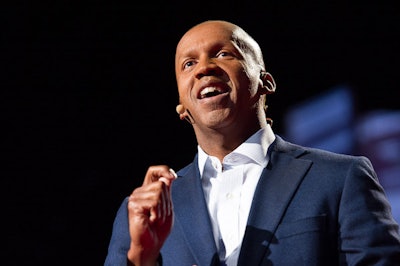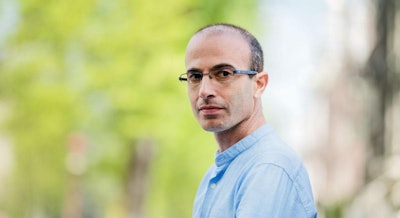Salesforce’s ninth annual Education Summit took place virtually for the second year in a row, with educators and administrators joining in from around the world to share the innovative ways they’re building institutional and student success despite the challenges posed by an ever-changing world.
The event, co-hosted by the University of Colorado, kicked off with presentations from two high-profile figures — historian Yuval Noah Harari and legal expert and civil rights attorney Bryan Stevenson — both of whom posed potential solutions to two major hurdles facing the future of higher education: an unpredictable workforce and racial injustice.
In addressing racial injustices still existing in the U.S. and, inevitably, in higher education too, Stevenson began the morning by emphasizing “the power of proximity” when it comes to educating underrepresented students. Before universities can address inequities, he said leaders must learn to get close to the students they’re trying to reach.
“To create healthy educational environments and to make a difference in the lives of young people … we have to commit to getting proximate to the poor, the neglected, the abused, the traumatized and the disfavored where they exist,” said Stevenson.
 Bryan Stevenson
Bryan StevensonA legal expert and social justice advocate, Stevenson — who is perhaps most known for his best-selling memoir Just Mercy — is founder and executive director of the Equal Justice Initiative and a law professor at New York University School of Law. In his presentation, he credited part of his success as “the product of someone’s choice to get proximate.”
Born in 1959, Stevenson grew up in a community that had long resisted integration. When his father was a teenager, Black students were not allowed in public schools and there were no high schools available for Black students. That is, until lawyers came into his community and forced the school district to abide by the law.
“Because those lawyers got proximate, I got to go to high school, I got to go to college, I got to go to law school,” Stevenson said. “I’m here because people who cared got proximate to me.”
In “getting proximate,” he added that educators must be comfortable getting uncomfortable and that they must work to change the narrative of race in America.
“Our commitment to children has to be expressed not by how well we treat the talented and gifted, but by how we treat the poor, the neglected, the children who are struggling, the children for whom education is critically urgent,” he said.
A globally known historian who is best known for his book Sapiens: A Brief History of Humankind, Yuval Noah Harari has devoted his career to studying the past. While politics and pandemics have always been unpredictable, Harari said the workforce has historically been predictable — until today.
“Throughout history, people always knew what the job market would roughly look like in 20 years and what skills they would need to teach young people today, so that they will be able to find work,” said Harari.
But with the changing advancements of artificial intelligence and automation, that predictability no longer exists.
 Yuval Noah Harari
Yuval Noah Harari“Nobody knows what the world will look like in 20 or 30 years,” Harari said. “Nobody knows what the job market will look like, what kind of skills people will need. This is the first time in history this has happened.”
It’s an especially prescient warning to higher education, he said. While other sectors may be able to wait “and see which way the wind is blowing,” higher education needs to know “what to teach young children and teenagers and college students today so that they will be prepared for the world of 2040.”
So how do you prepare students for an unpredictable future? First, Harari recommended that colleges teach students how to be lifelong learners who have the tools to reinvent themselves repeatedly.
“The only certain thing is that the future will be extremely volatile and fluid, and people will need to reinvent themselves again and again and again,” noted Harari.
Likewise, he recommended that universities be proactive in adjusting their curricula to the changing workforce. For instance, he said a crucial course that universities should already be implementing is ethics in computer coding. In the same way that doctors take medical ethics courses, he said students today must learn ethics within computer science.
“Universities need to understand the new challenges of the 21st century, and be ahead of the curve and change what they teach,” said Harari. “… It’s really a scandal that the people who designed the world now didn’t have to take a course in politics or ethics. If you’re redesigning the world, you should be aware of the implications of what you’re doing.”
But with access to technology not evenly distributed across the globe — or even in the U.S. — the “heart of the education challenge is that the benefits and the profits of the new technology are not divided equally,” he cautioned.
“When I think about 2040 I’m not so worried about American undergraduate students, or even about American kids, they will somehow be okay, even maybe even better than okay,” said Harari. “But who is going to educate and to train and retrain the hundreds of millions of people in countries like Honduras or Indonesia or Nigeria?”
It’s a relevant question for a conference that is focused on digital transformation and hosted by Salesforce, a customer relation management service that specializes in cloud-based software. One of the largest employers in San Francisco, Salesforce has become increasingly involved in providing technological platforms to the education industry.
In line with Salesforce’s mission, speakers from institutions across the globe praised the virtues of incorporating technology into every aspect of higher education: from recruitment to student success and alumni relations. Salesforce’s “Education Cloud,” for instance, was collectively extolled by various institutions — such as Ivy Tech Community College and Purdue University — throughout the day for its ability to “drive learner and institution success with 360-degree views across the entire educational journey.”
In listening to Harari, Peter Schwartz, Salesforce’s senior vice president for strategic planning expressed hope for the future.
“One of the most successful remote education universities in the world is Monterrey Tech in Mexico, so I have a modest degree of optimism about the system being able to adapt,” he added.
Jessica Ruf can be reached at jruf@diverseeducation.com


















